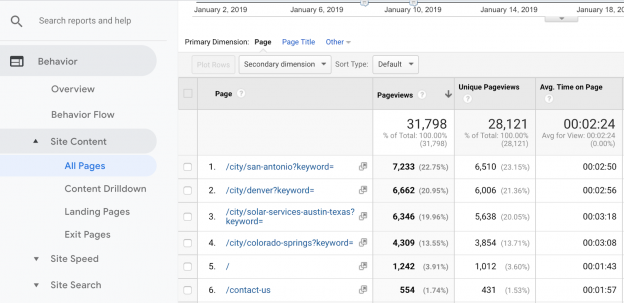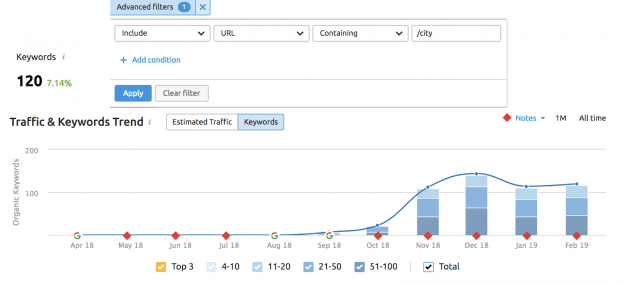
Recently, we have been talking a lot about Google's bias towards searcher proximity and the various digital marketing, content and SEO tactics to overcome it. We’ve reviewed some of the available paid options like Google’s local services ads and location extensions on paid search ads. We’ve also discussed ways you can incorporate geo-specific text throughout the content on your existing web pages. However, one of the most effective tactics we have found for the HVAC, Home Performance and Solar markets, in particular, has been the publication of new, comprehensive, content rich “City Pages.”
Today, we’ll focus on that tactic in more detail and explore some best practices, the major no-no’s, and some benchmark performance results for a well executed City Page.
What Are City Pages?
City pages are unique pages of content on your website, dedicated to a specific geographical area. They can take various shapes and formats — from the simple to the robust — incorporating elements beyond basic paragraphs of text, such as:
-
Embedded maps
-
Photos of the area
-
Customer testimonials
-
Reviews
-
Case studies
-
Project galleries
-
Geo-specific service information
Why Are City Pages Important?
When done well, City Pages can be one of the most versatile tools in your digital marketing toolbox. With the right mix of content and functionality, they can both stand on their own as independent landing pages and work in concert with the content strategy for the rest of your site.
On their own...
As an independent landing page, a city page can serve as a great destination for geo-targeted PPC or Facebook ads. It’s able to include much of the helpful information that’s available throughout the rest of the site (like details about services, reviews and testimonials, contact options, and links to more information), while also offering users a more personalized and relevant experience which tailors that information to their specific location.

When used as a landing page destination for paid advertising, city pages can act as an even more relevant and conversion optimized experience for users than the home or contact page. This Texas / Colorado based solar company saw 2 and 3 times longer session durations on their city pages than on their home page in the month of January 2019, and over 6x the number of page views (from PPC traffic.)
As a team...
As part of a broader, integrated content strategy, city pages offer enormous opportunity to strategically incorporate some of the most influential search ranking factors into your website content, such as:
-
Semantically related terminology
-
Keyword rich testimonials and reviews
-
Visually engaging photos with descriptive alt-text and captions
-
Comprehensive metadata, page titles and structured schema
-
Internal linking and destination anchor text for third party inbound links
All of these factors support more universal objectives like improved organic and local SEO, as well as an optimized UX / UI by acting as important signals to Google that the content on your site is relevant, comprehensive and up-to-date.

The same TX & CO based solar company was able to achieve a significant increase in the number of keywords for which their site ranks in organic search results by incorporating city pages into their website content strategy. This image from SEM Rush shows that their City Pages alone rank for 120 different keywords in organic search results, That's 120 different search queries they may not otherwise have any visibility for without the important content on those city pages.
Because everyone else is doing it...
Finally, city pages are important because … competition. Local businesses, and home performance and HVAC service professionals, in particular, know how tough it can be to gain ground in organic SERP when the competitive landscape is crowded and cut-throat. At Energy Circle, we are often asked “Why is this company showing up above me in organic search results?” Oftentimes, at least part of the answer is — this company has robust, geographically specific content highly visible throughout their website, which signifies to search engines that their site will be more relevant to searches looking for services in those particular areas.
Being aware of the proximity bias, and the value placed on relevance and comprehensiveness of content when it comes to search rank and share, it’s obvious that City Pages are one of the most effective competitive tactics we have at our disposal.
City Page Dos and Don'ts
As digital marketing and content strategists, the team at Energy Circle likes City Pages because they can be a relatively easy way to inject geographically specific content into your existing website. The presence of location based keywords in your metadata, copy and structured markup can provide a boost in organic and local search visibility.
But, we also know that SEO is no longer just about keywords – and the overuse of targeted search terms without relevant context (or “keyword stuffing” as we’ve come to know it) can actually harm your SEO.
So, how do you do a City Page right? By following a few simple rules of thumb:
-
Do include accurate, local imagery: Whether it’s stock or photos from your own archive, make sure images are as specific and granular as possible. Think about using a hero image that includes local landmarks or that is representative of specific landscape or geographical features or even weather for that city.
-
Don’t “mad-lib” it: The point of a good city page is to be hyper relevant to your potential customers in a very specific geo. Don’t take a “fill-in-the-blank” approach to crafting the content for these pages. Not only will it fall flat with your audience, but also Google is onto you! Duplicated city pages = duplicate content = bad for SEO.
-
Do feature local case studies and testimonials: One of the greatest strengths of a city page is how relatable the content is to a potential customer. People are often interested in hearing from other customers who are just like them, or in seeing other projects that are similar to their project. Incorporate case studies, galleries, and reviews or testimonials from people and projects in the area.
-
Don’t act like a tourist: Use colloquial terms, local slang, nicknames or phrases, maybe even crack an inside joke. This is your opportunity to show your customer base that you’re one of the locals; take it!
-
Do map it out: Embed a service area map! It’s the easiest way to literally drop a pin on your territory, and it’s a helpful visual tool for visitors to the page who are really just after one thing — “Do you service my area?”
-
Don’t overthink it: The beauty of a city page is it literally shouldn’t be everything to everyone. Pick a city and figure out what’s important to the customer base there. Maybe it’s a specific weather concern like moisture or ice. Maybe it’s a specific environmental concern like air quality or carbon footprint. How do your services address that specific concern for that specific area?
-
Don’t keyword stuff: This may be a no brainer, but it’s worth ending our list with a “double don’t” because it’s so important! Don’t use city pages as a way to load a whole bunch of city and town names into your website content with no context or relevant details. Keyword stuffing is one of the most egregious SEO no-no’s you can commit and Ma Google will punish you for it!
Conclusion
It’s no secret that when it comes to SEO, local visibility and conversion optimization, content is king. Relevant, comprehensive and hyper-tailored messaging, imagery and experiences are what most consumers are looking for; and a well crafted, thoughtful and robust collection of City Pages on your website is a sure-fire way to relate to your target audience in a way that builds trust and consideration for your business.